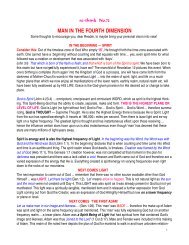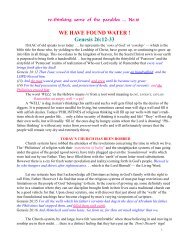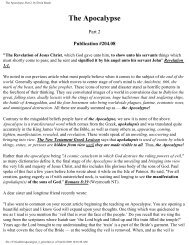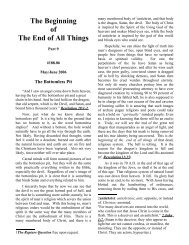Create successful ePaper yourself
Turn your PDF publications into a flip-book with our unique Google optimized e-Paper software.
22 •LINCOLN THE UNKNOWNThe paper money in circulation at that time, in <strong>the</strong> wilderness,was often of very doubtful value. Much of it was worthless.So hogs, venison hams, whisky, coon-skins, bear-hides, andfarm produce were much used as mediums of exchange. Evenpreachers sometimes took whisky as part pay for <strong>the</strong>ir services.In <strong>the</strong> autumn of 1816, when Abraham was seven years old, oldTom <strong>Lincoln</strong> bartered hisKentucky farm for about four hundredgallons of corn whisky, and moved his family into <strong>the</strong>gloom and solitude of <strong>the</strong> wild and desolate forests of Indiana.Their nearest neighbor was a bear-hunter; and all about <strong>the</strong>m<strong>the</strong> trees and brush and grape-vines and undergrowth were sothick that a man had to cut and hack his way through it. Thiswas <strong>the</strong> spot, "Rite in <strong>the</strong> Brush," as Dennis Hanks describedit, where Abraham <strong>Lincoln</strong> was to spend <strong>the</strong> next fourteen yearsof his life.The first snow of winter was already falling when <strong>the</strong> familyarrived; and Tom <strong>Lincoln</strong> hastily built what was <strong>the</strong>n knownas "a three-faced camp." To-day it would be called a shed. Ithad no floor, no door, no windows—nothing but three sides anda roof of poles and brush. The fourth side was entirely opento wind and snow and sleet and cold. Nowadays an up-to-datefarmer in Indiana wouldn't winter his cattle or hogs in such acrude shelter, but Tom <strong>Lincoln</strong> felt it was good enough forhimself and his family all during <strong>the</strong> long winter of 1816-17,one of <strong>the</strong> severest and most violent winters in our history.Nancy Hanks and her children slept <strong>the</strong>re that winter likedogs, curled up on a heap of leaves and bearskins dumped on<strong>the</strong> dirt floor in a corner of <strong>the</strong> shed.As for food, <strong>the</strong>y had no butter, no milk, no eggs, no fruit,no vegetables, not even potatoes. They lived chiefly on wildgame and nuts.Tom <strong>Lincoln</strong> tried to raise hogs, but <strong>the</strong> bears were so hungrythat <strong>the</strong>y seized <strong>the</strong> hogs and ate <strong>the</strong>m alive.For years, <strong>the</strong>re in Indiana, Abraham <strong>Lincoln</strong> endured moreterrible poverty than did thousands of <strong>the</strong> slaves whom hewould one day liberate.Dentists were almost <strong>unknown</strong> in that region, and <strong>the</strong> nearestdoctor was thirty-five miles away; so when Nancy <strong>Lincoln</strong> hada toothache, probably old Tom <strong>Lincoln</strong> did what <strong>the</strong> o<strong>the</strong>r pioneersdid; he whittled out a hickory peg, set <strong>the</strong> end of it against<strong>the</strong> complaining molar, and hit <strong>the</strong> peg a hard blow with a rock.From <strong>the</strong> earliest times in <strong>the</strong> Middle West <strong>the</strong> pioneers suf-
















